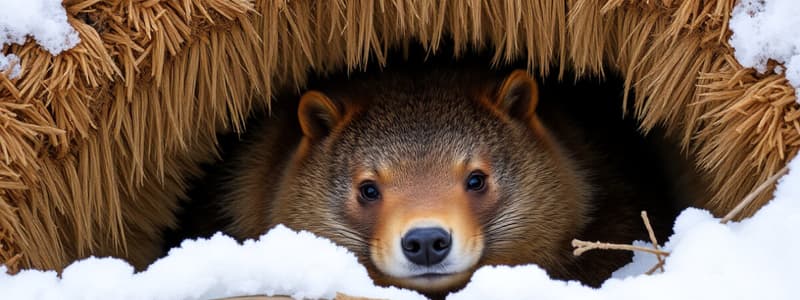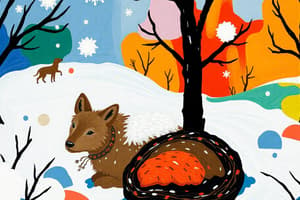Podcast
Questions and Answers
What is the main purpose of hibernation for animals?
What is the main purpose of hibernation for animals?
- To lower body temperature.
- To migrate to warmer climates.
- To find food in winter.
- To conserve energy and survive winter. (correct)
How do animals prepare for hibernation?
How do animals prepare for hibernation?
- By building nests in trees.
- By storing food and gaining weight. (correct)
- By increasing their metabolic rate.
- By migrating to warmer locations.
Which of the following animals is commonly known to hibernate?
Which of the following animals is commonly known to hibernate?
- Lion
- Turtle (correct)
- Dolphin
- Sparrow
What happens to an animal's metabolism during hibernation?
What happens to an animal's metabolism during hibernation?
Why is hibernation essential for animals in winter?
Why is hibernation essential for animals in winter?
What chemical does the animal's body produce that induces sleep during hibernation?
What chemical does the animal's body produce that induces sleep during hibernation?
Which animal can gain up to 30 pounds per week in preparation for hibernation?
Which animal can gain up to 30 pounds per week in preparation for hibernation?
What type of shelter do animals generally find for hibernation?
What type of shelter do animals generally find for hibernation?
During hibernation, what happens to an animal's activity level?
During hibernation, what happens to an animal's activity level?
What can happen to animals without thick fur during severe winter conditions?
What can happen to animals without thick fur during severe winter conditions?
Flashcards
Hibernation?
Hibernation?
A process where some animals enter a prolonged sleep during cold weather.
Metabolism
Metabolism
The rate at which the body burns calories.
Scarce food
Scarce food
When animals have limited access to food during winter.
Shelter
Shelter
Signup and view all the flashcards
Instincts
Instincts
Signup and view all the flashcards
Preparing for hibernation
Preparing for hibernation
Signup and view all the flashcards
Bear weight gain
Bear weight gain
Signup and view all the flashcards
Sleepy chemical
Sleepy chemical
Signup and view all the flashcards
Slowed heart rate and breathing
Slowed heart rate and breathing
Signup and view all the flashcards
Animals that hibernate
Animals that hibernate
Signup and view all the flashcards
Study Notes
Hibernation
- Hibernation is a deep sleep animals enter during harsh winter weather, helping them survive lacking food and extreme cold.
- Animals prepare for hibernation by eating large amounts of food in the fall to gain weight and energy reserves.
- Their metabolisms slow down to conserve energy.
- Hibernation is crucial for survival in environments where food becomes scarce in winter and temperatures plummet.
- Many plants stop producing food sources, and prey animals may also hibernate, reducing food availability.
- Animals with thin fur or no ability to warm up risk freezing without hibernation.
Importance of Hibernation
- Hibernation allows animals to avoid the constant struggle for food and cold weather survival.
- Animals find safe shelters to sleep during winter.
- Animals' bodies enter a state where they conserve energy by slowing heart rate and lowering body temperature.
Animals During Hibernation
- Hibernating animals include bears, ground squirrels, groundhogs, hedgehogs, rodents, mice, raccoons, bats, wood frogs, woodchucks, turtles, and some insects.
- Animals have an instinctive response and prepare for hibernation by eating a lot of food before winter.
- Bears, for instance, can gain significant weight—up to 30 pounds per week.
- Animals' bodies regulate by slowing heart rate, breathing, and dropping body temperature during hibernation.
- Woodchucks' heart rate and breathing decrease dramatically during hibernation.
- Hibernation involves lowering body temperature to near freezing to further decrease energy use.
- Animals like woodchucks may briefly wake to shiver and raise their body temperature when it drops too low.
- Hibernation ends when spring arrives, and the weather warms.
- Examples of how each animal can be impacted vary. Bears have slower heart rates. Ground squirrels have slower heart rates.
Studying That Suits You
Use AI to generate personalized quizzes and flashcards to suit your learning preferences.




